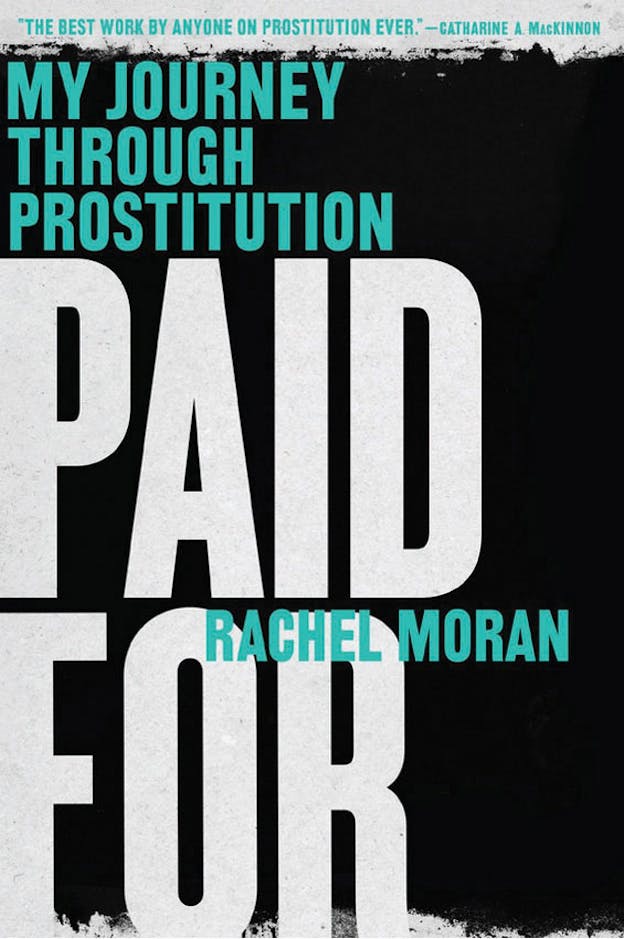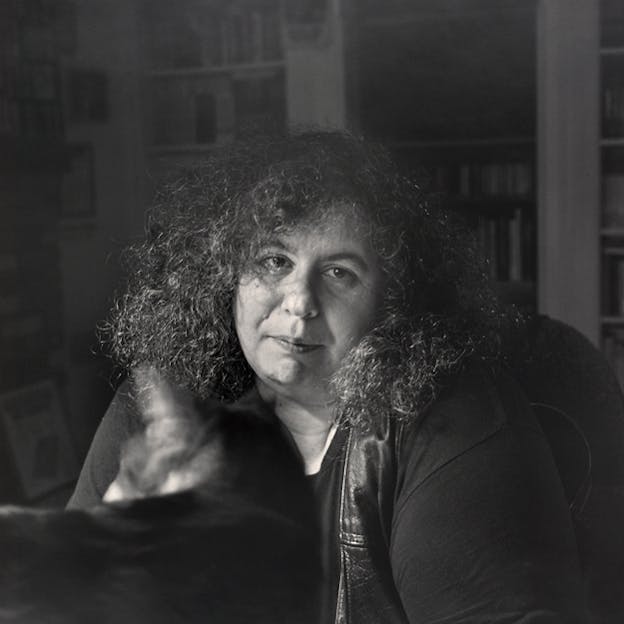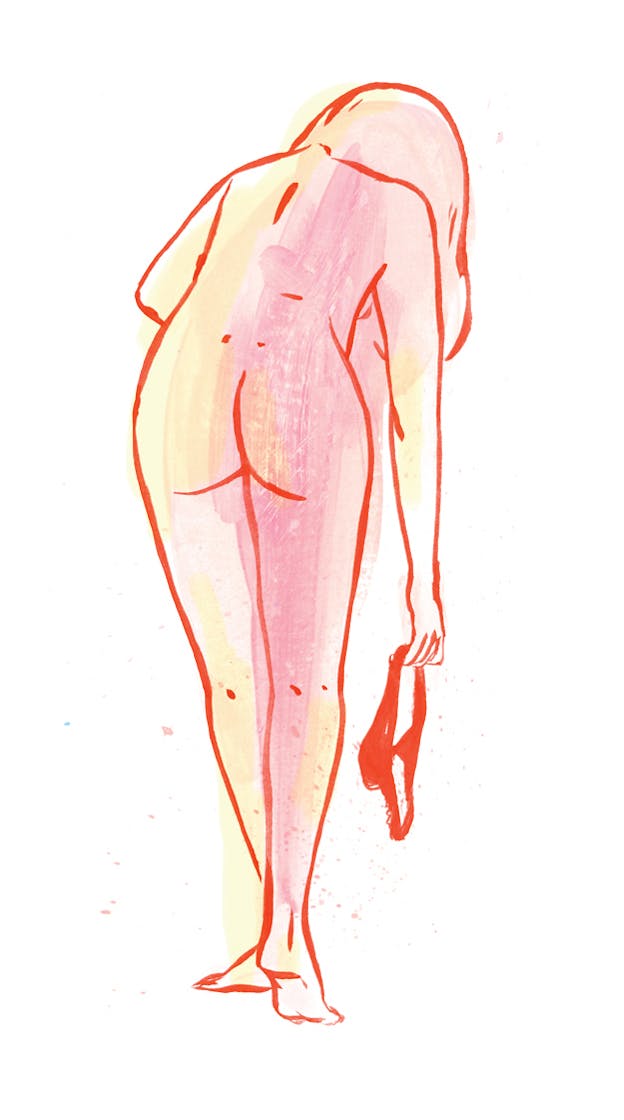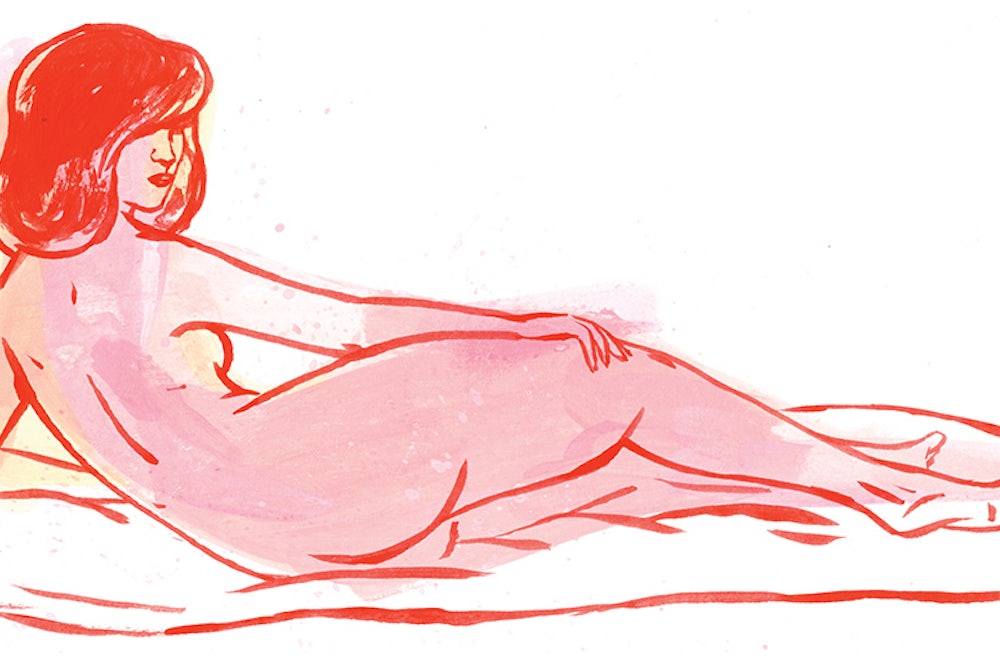In America, it is perhaps the highest sign of respect to argue that prostitutes should have the same rights as corporations: to labor free of government regulation or interference and to mine their bodies for every ounce of profit the flesh can yield. A prostitute’s humanity belongs in the same breath as her commercial value; she deserves protection not because she is a person or even a citizen but because of her economic contribution to society. Activists lobbying for the decriminalization of prostitution laud governments for moving past the antique notion of “morality” in favor of regarding sex work as plain old work. It’s a compelling and at times appealing argument, and Irish journalist Rachel Moran is having none of it.

Moran became a prostitute at the age of 15. (She prefers, and uses, the term “prostituted woman,” because “a woman can only be a prostitute when she has been prostituted by somebody else.”) Her book, Paid For: My Journey Through Prostitution, is new to American readers but already well-known in Ireland, where it became a best-seller upon its publication in 2013. More recently, Moran played a pivotal role in legislation that Northern Ireland passed this June to criminalize the act of paying for sex—to penalize not the prostituted, but the prostitutors. Moran urges her readers to return to the question of morality and remain there no matter how uncomfortable it may become. It’s an argument that demands the reader see decency, not autonomy, as a society’s cardinal virtue, and that assumes the average woman will turn to prostitution not because she chooses to do so, but because she is utterly desperate and lacks any other viable choices.
Within an already brave book, this is a particularly brave argument. Moran is not just going against the libertarian arguments that have become relatively commonplace, but offering an implicit indictment of liberals’ unwillingness to discuss morality—their fear of acquiring a whiff of the “think of the children” mentality of the far right, which aligns God against everything that its constituents find upsetting (gay marriage, trans rights, feminism, sometimes even racial equality). By focusing her argument not on a nebulous discussion of economic freedom, but on her own moral convictions, Moran risks being dismissed as an embarrassing throwback, like the temperance advocates of the early twentieth century, who opposed alcohol because, they claimed, it was just plain wrong.
If Moran has a model for this posture and the particular strain of feminism that it represents, it is the second-wave radical feminist Andrea Dworkin. Like Moran, Dworkin supported herself as a prostitute when she was a young woman (and also preferred the term “prostituted woman”). Dworkin seems an unlikely philosophical mentor amid the current, fun-loving feminist atmosphere. She functions now as a kind of ghost at the feast: serious, prophetic, furious, and seemingly both unwilling and unable to separate public policy from personal pain—the kind of figure that today’s sex-positive, feminism-is-for-everyone contingent has tried, at times desperately, to ignore. “When most people think of Andrea Dworkin,” Ariel Levy wrote in a New York magazine profile shortly after Dworkin’s death in 2005, “they think of two things: overalls and the idea that all sex is rape.” If Gloria Steinem offered American women reassurance that they could be feminists and live enviable lives—complete with relationships, sex, career success, and a pair of kicky aviators—then Dworkin could make the mere act of being born female seem like a death sentence. For women who look to feminism for a sense not just of purpose but of empowerment, Dworkin remains an alienating figure.
But Moran makes a powerful case that Dworkin was on to something. At the center of Dworkin’s strident and at times hyperbolic discourse, there was a core of profound idealism. If one woman was in pain, Dworkin’s arguments went, then all women were. If one woman was being abused, then it was the world’s duty to save her. Decades after Dworkin, Moran was in pain; Moran was being abused. And she had no one to save her but herself. Perhaps we should have taken Dworkin more seriously from the beginning.

In 1981 at Harvard, Dworkin debated the legality of pornography against Alan Dershowitz, who argued (as many still do) that censoring porn would mean obliterating the First Amendment. His argument was legally, intellectually, and constitutionally sound, and Dworkin didn’t seem to give a rat’s ass. Pornography was not an intellectual issue, she argued, but an emotional one. The First Amendment was also irrelevant, because it “was written by white men who owned women and slaves.” Dershowitz may have (literally) written a book on chutzpah, but Dworkin knew how to walk the walk: She formulated an argument based not on whether she judged it to be politically savvy or even persuasive, but whether she believed it to be true.
The question was whether anyone could take her seriously. Often, during her lifetime, the answer was no. Dworkin lost credibility in the feminist community after her 1986 testimony before the Attorney General’s Commission on Pornography made it seem she was willing to collaborate with anyone—even the Reagan White House—so long as they supported her goals. The Antipornography Civil Rights Ordinance, which she co-authored with the lawyer and feminist Catharine MacKinnon, represented her greatest triumph in combating pornography but was voided in the few local jurisdictions where it managed to go into effect. When she did find success, she succeeded a little too much: MacKinnon submitted a brief for a now infamous Canadian supreme court ruling that would later be used to ban the sale of Dworkin’s books.
Yet Dworkin’s alleged crimes—being risible, politically maladroit, and at times needlessly hyperbolic—did not make her nearly so ripe a subject for mockery as her sincerity did. She said what she said and did what she did because she believed it was the only thing to say or do, and this belief issued from the taproot of her own pain. That she made no secret of this made it all the easier for her detractors to dismiss not just her arguments, but her whole career. Dworkin had, Camille Paglia wrote for Playboy in 1992, “turned a garish history of mental instability into feminist grand opera.” Her mode, some argued, was, effectively, bullying: forcing a conversation beyond the bounds of rational discourse and making her opponent join her there.
You can call this an act of destruction, but you can also see it as the only real way to talk about prostitution. “Prostitution is not an idea,” Dworkin said in a 1992 speech, later collected in her book Life and Death. “It is the mouth, the vagina, the rectum, penetrated usually by a penis, sometimes hands, sometimes objects, by one man and then another and then another and then another and then another. That’s what it is.” Moran uses this quote as a chapter epigraph, but leaves out Dworkin’s subsequent command to the audience and the reader, perhaps because it is already implicit in every line of Paid For: “I want you to feel the delicate tissues in her body that are being misused. I want you to feel what it feels like when it happens over and over and over and over and over and over and over again: because that is what prostitution is.”
Paid For begins with Moran’s troubled upbringing, then moves to her dual exile: onto the streets at the age of 14, and at 15 into life as a prostituted woman. The financial desperation that fueled her first experience of being prostituted—both by her john and by her 21-year-old boyfriend—is obvious enough. Moran is less clear on whether any particular moment or event spurred her, at 22, to leave prostitution. Yet by the end of Paid For, the reader can easily understand her desire, as she puts it, to find “what was left of my original self.”
Moran bolsters her observations about prostitution with studies and statistics, so that the reader learns, for example, that an estimated 10 percent of British males use prostitutes, or that, in Italy, “nine million men were said to be using 50,000 prostitutes”—which Moran further breaks down to a staggering ratio of “180 male prostitutors for every one prostituted female.” For the most part, however, her arguments are drawn from personal exposure and her belief that the experience of being prostituted contains a universal core of dehumanization: “The attempt to frame prostitution as ‘sexual self-determination’ simply doesn’t hold up,” she writes, “because our decisions were not sexual, they were economic.”
Throughout Paid For, prostitutes are not the economically savvy or sexually enlightened free agents we may imagine them to be. They are not the corporation. They are the product endlessly objectified, sold, and consumed. Responding to those who say that prostitution “is no better or worse than flipping burgers at McDonald’s” Moran quotes a respondent in a 1999 study conducted by Evelina Giobbe: “In McDonald’s, you’re not the meat! In prostitution, you are the meat.” Anyone who has had even the most glancing encounter with that reality, Moran argues, should recognize this, and failure to do so suggests willful ignorance. “[Construction] workers don’t need to fear developing cancer from what they come into daily contact with any more,” Moran writes. “The world knows better about asbestos now.… The world is just as enlightened, on a soul level, about prostitution, but does not act upon it because the sexual pleasure it affords men is deemed more important than the duty to treat women equally in humanity.”
Moran supports her argument not only with her own knowledge but with the experiences of other prostitutes she worked alongside: the woman who “fantasized about killing her clients” in order to get through the ordeal of servicing them; the woman who prostituted her 13-year-old daughter while working the streets herself; the mothers who “only appeared on the streets sporadically, a few times yearly, and always in the run-up to Christmastime or Communion season or the new school year.”

Moran’s own reminiscences are no less grim, and no less revealing. She does not parcel them out in discrete sections, but dispatches them sporadically, so the reader can be humming along at the distance that theory conveniently affords when Moran suddenly launches into a story about being picked up by a john who not only recognized her but told her he knew her father before he committed suicide. Moran, 15 at the time, assumed that “this made things impossible.” Instead, the john “grabbed me by the back of the head and mashed his lips against mine. His fingers locked into the muscles at the nape of my neck so that I couldn’t turn my head.… He took out some money and then he took out his prick and I did what I had to do.” This is not the most heartbreaking story in Paid For, but it encapsulates all too well the kind of damage Moran shows prostitution producing: a profound disassociation from the self, an inability to trust others, an overwhelming sense of disconnection from society, and shame.
One could dismiss Moran’s arguments as wholly personal; this is a book fueled by the kind of true-life story we expect to find animating Lifetime movies more often than serious books. Yet this objection still does not allow the reader to approach prostitution as an idea outside of ethics. In Moran’s argument, prostitution cannot exist as a “profession” in which only the potential for depravity exists because it is, by its very definition as a world where one person commodifies and uses another, depraved. “If there is nothing wrong with prostitution,” Moran writes, “then why deny the presence of the fundamentals that make up its lived experience?”
Paid For will doubtless still find its detractors among American readers. Even those who do not see prostitution as a bizarre iteration of the American autonomy myth, or align themselves with Dworkin’s critics, may still think of it as a necessary evil and believe that the best we can do is regulate the enterprise. Before I read Paid For, I was one of these people, maintaining what I saw as a pragmatic approach to an indelible part of society. The alternative, I believed, was moral panic, and a desire to see human nature as we might like it to be rather than as it is. Paid For changed my mind.
In Paid For, Moran makes a simple yet blisteringly powerful argument: Prostitution does not need to exist just because it always has. To argue that prostitution is a fact of life is, Moran would seem to suggest, akin to making the same argument about domestic violence or child molestation. It means taking for granted that sexuality will always be defined along these lines: what a man wants, what a man must have, and what he will purchase or obtain forcibly if necessary. In this schema, men define sexuality, and girls and women—whether prostituted or not—can only bend sexualities around male desire. To accept prostitution as an eventuality means accepting this model of sexuality; it means accepting that objectification, if not brutality, is a woman’s lot in life.
But as Paid For makes clear, we have been painfully unaware of exactly what we are accepting. Paid For forces us to come to terms with the realities of prostitution. The argument that only Moran experienced prostitution the way she describes—or only the women whose stories Moran included, or only a few women—means little. It is too much for any woman to experience what she has.
Like Dworkin, Moran does not attempt to be a cool, with-it feminist. Her feminism is of the powerful, disruptive variety that too many women studiously avoid, petrified that it will make them seem—what?—too subjective, too emotional, too female. “I can’t afford to shy away from ridicule here,” she says. “It would prevent me from telling the truth.” But Paid For still manages the rare feat of being both harrowing and gentle. Moran resists Dworkin’s occasional weakness for unequivocal claims about female experience: She speaks only for herself, and in allowing the reader the astonishing gift of seeing the unvarnished truth of her experience, she lets them inhabit her story completely.
It is a work of tremendous authorial generosity, but it comes with a price. “It is my hope,” Moran writes in the final pages of Paid For, “that after having read this book at least some people will come to a fuller understanding of the simple immorality of prostitution.” If the reader takes this message to heart, then her task, upon closing the book, is simple: She must begin thinking about how to pay Moran back, and how to trade in change for generosity.
An earlier version of this article incorrectly stated that Northern Ireland passed legislation in June that criminalized the act of paying for sex for both the prostituted and the prostitutors. It is, in fact, only the prostitutors.
